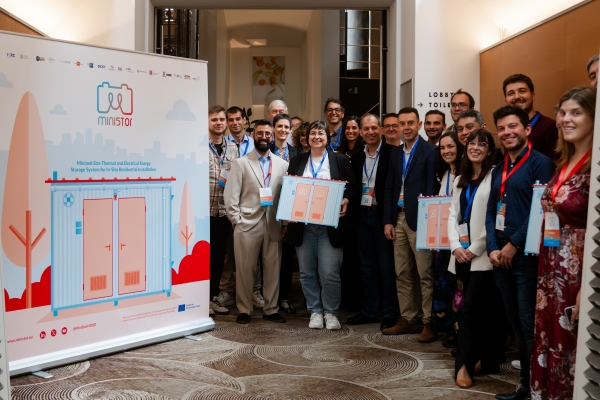
MiniStor completes its research on high-capacity thermal energy storage with a final conference under the EUSEW
Date
Sections
MiniStor presented its research results and policy recommendations for sustainable thermal energy storage with an ambitious agenda of activities, from 9 to 12 June, in Brussels. The final event was held under the umbrella of the European Sustainable Energy Week (EUSEW), attracting close to 150 people in a hybrid format. MiniStor was accompanied by relevant initiatives in Renewable Heating and Cooling, the built environment, and energy value chains, as well as expert panellists and external consultants, with a total of 11 countries represented.
The programme was initiated as an Energy Day supported by the EUSEW, dedicated to the conference ‘Reaching the decarbonisation goal’ on June 9th, and continuing with the policy recommendations and panel discussions on the 10th. Among the public and participants, there were members from MiniStor's Consulting and Ethical Boards -Cardiff University, University of Warwick, academia -University of Barcelona, ISQ, INESC TEC, Wageningen UR, University College Dublin, and industry associations -CLUERGAL, Solar Heat Europe. A recording of all the interventions is available in the channels of the project, featuring 8 project presentations, 3 policy brief presentations, and two panel discussions on thermal energy storage.
As the EUSEW conference was in full spring, MiniStor moved to the Energy Fair for June 11th and 12th, hosting Stand C5 in the Charlemagne Building of the European Commission alongside projects Maxima and SteamDry, under the title ‘Powering a Green Europe: EU Projects in action’. This was most relevant given that MiniStor has reached its goal of Technological Readiness Level 7, with prototypes demonstrated in an operational environment prior to market access. In that sense, MiniStor has advocated for new and more suitable standards for thermal energy storage in residential use, supporting adequate performance certificates as well as improved regulations for the installation, maintenance, and recycling of the system. In particular, the project made recommendations to provide a framework for its main technological driver, the use of ammonia as an energy carrier.
Ammonia is environmentally friendly and relies on a well-established supply chain with a growing number of uses. MiniStor has also demonstrated that it presents a comparative advantage in flexibility and reliability and can be scaled while remaining manageable with little intervention. However, current regulations are designed for industrial installations and are therefore disproportionate for the residential sector, including permits, training for technicians, new standards for monitoring and containment within the Seveso III directive, and pre-certification of ammonia-based, low complexity systems using modular components.
After a 68-month effort funded via the European Union’s Horizon 2020 research and innovation programme, MiniStor realised the concept envisioned by CNRS-Promes and CERTH-CPERI of a high-density thermal energy storage capable of providing heating, cooling, and electricity in multiple climate conditions and home configurations. MiniStor is a fusion of novel technologies: an efficient thermochemical storage based on calcium chloride and ammonia salts, a phase-change material that stores latent heat, unique hybrid photovoltaic thermal solar collectors, and a smart digital tool assisted by an Internet of Things platform to handle the operation and assist the user in long-term decisions. It is a human-centric system that can operate autonomously year-round- a smart solution to ensure comfort while storing thermal energy and electricity when they are abundant and releasing them when in short supply. Its capacity and reliability increase the use of renewable energy sources, moving Europe closer to a decarbonised residential sector.
The MiniStor solution was deployed starting in 2023 and has been evaluated since in an operational environment of real-life conditions in a total of one pre-pilot and four demonstration sites, following the most rigorous standards in the European Union. These five sites represent residential usage, from social dwelling to student apartments, having diverse climatic conditions, thermal load needs, energy realities, expectations, and regulations. They are in Greece, Hungary, Spain, and Ireland.
Seventeen partners across the European Union and Switzerland, coordinated by IERC, began working in 2019 on a sustainable solution to harness the energy efficiency potential of the European building stock. MiniStor can provide energy security across Europe’s residential sector with a thermal storage density well over 10 times that of water, a practical solution for leveraging the variability of renewable energy sources. It is expected that MiniStor technologies will operate beyond the 20-year lifespan specified in the funding call, coupled with a circular business model to ensure that the system is supported throughout its lifecycle and recycled if it is no longer needed.
____________________________
To know more about the project: ministor.eu
Project coordinator: Carlos Ochoa (IERC) carlos.ochoa@ierc.ie
To stay connected to the project’s news on X and LinkedIn: @MiniStorH2020
Job of the week
Agenda
Subscribe to our Job Letter!
















































































